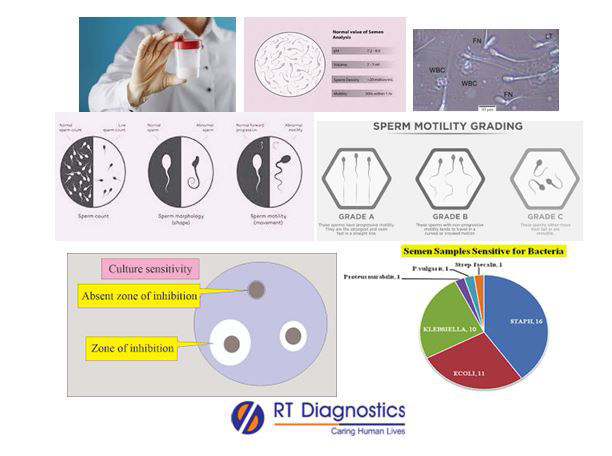Semen Culture and Sensitivity:
Why Culture and Sensitivity (For Microbial Growth) – In Semen Specimen Test?
CLINICAL INFORMATION
Semen is a complex substance produced by the male reproductive organs. It is a grayish-white or yellowish tint body fluid secreted by the gonads (sexual gland of the male). Semen is also called the seminal fluid that is mainly composed of water, plasma, mucus, citric acid, lipids, sperm/spermatozoa, proteins, fructose, essential nutrients eg. sodium, potassium, zinc, chlorine, magnesium, phosphorous, vitamin B12 uric acid, lactate, enzymes (proteolytic enzymes) like acid phosphatase, etc, blood group antigens and other nutrients that will help the sperm to survive to facilitate successful fertilization. This microbial pathogen test in semen culture is performed in certain suspected patients with clinical manifestations of infection and/or inflammation and also infertility-related issues in males eg. IVF etc. Other tests include complete semen analysis that measures liquid portion called seminal fluid and the microscopic part i.e moving cells called sperms, number of WBCs (indicating infection, etc). The assessment includes evaluation of the physical and chemical properties of human semen like pH, viscosity, osmolarity, coagulation, and liquefaction, buffering capacity and also includes the estimation of qualitative (eg. normal morphology, number of immature sperms, motility, etc) & quantitative analysis (eg. volume like sperm density, etc) of the specimen. Factors that can affect the sperm count or semen analysis values include the use of alcohol, tobacco, caffeine, medications such as cimetidine, etc. Culture and Sensitivity test for microbial growth in semen specimen test helps in arriving at a definitive diagnosis thereby ruling out other similar possibilities of pathology causing such similar clinical manifestations. Semen test helps to detect DNA damage test (detection of DNA fragmentation by TUNEL assay) in sperm cells leading to infertility cases, hemospermia (abnormal pink or reddish colored seminal fluid) which could be due to inflammation, infection, blockage, or injury of the male reproductive tract such as the urethra, testicles, epididymis or prostate, etc and also to detect infections related to STDs like HIV, HPV, etc, post-vasectomy confirmation, Semen cryopreservation – preservation of semen for IVF, etc. A culture and sensitivity test in semen aims at detecting potential pathogenic microbes (such as UTI, STD, etc) that may cause infection of the male genitor-urinary tract to prevent further complications such as male infertility (i.e it can cause impaired spermatogenesis - Oligospermia and in long term can lead to sterility in the male). Sperm bacterial (eg. E. coli, Staphylococcus, etc interferes with semen quality, activity, agglutination of the sperms, decreases sperm concentration, motility, morphology, vitality, etc of the sperm) contamination is quite frequent and could contribute to the deterioration of the sperm quality of infertile men and also early detection can protect from conditions like prostatitis –infection causing inflammation of the prostate gland. Clinical signs and symptoms of prostatitis include pelvic pain, urinary tract symptoms, dysuria, urinary frequency, urinary retention, fever, chills, nausea, emesis, malaise, etc. Other tests other than culture and sensitivity of semen for the source of infection includes microscopic examination and evaluation of semen analysis, blood tests like CBC, differential WBC count (in case of infection), Prostate-Specific Antigen test, testosterone, FSH, ELISA test for Mumps antibodies, etc, other hormonal assays eg. pituitary hormones (in case of tumors, etc), urinalysis to check for UTI, digital rectal examination to confirm pain and swelling of the prostate, CT Scan, ultrasound (vericocele), genetic tests like DNA, etc.

General Instructions:
Sample Requirement: Specimen - Semen Test Preparation: None.
NOTE - Sample for specimen collections may vary based on the patient’s condition / cases according to patient’s presenting complaints / signs or symptoms:
SPECIMEN REQUIREMENT (Special or Rare Cases) - As instructed and guided by Physician / Clinician / Pathologist / as per Laboratory’s requirements, according to procedures and protocols.
Sample Requirement: Semen.
Test Preparation: None
This Multi-Specialty Clinical Referral Laboratory RT DIAGNOSTICS provides precise and accuracy tests with an extensive range of testing service to the medical centers to help in the diagnosis and identification of pathology in the test specimens for infectious diseases and also to evaluate the function of organ systems of the patient. It prevents further complications and helps to stabilize and restore health to near normalcy at the earliest without delay.



